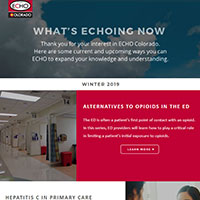The Assistant Secretary for Planning and Evaluation (ASPE) of the U.S. Department of Health and Human Services (HHS) released the long-awaited report called for in the Expanding Capacity for Health Outcomes (ECHO) Act of 2016. The 220-page report was requested as a part of Public Law 114-270 to inform the U.S. Congress on the growing interest, rapid adoption and current status of ECHO and ECHO-like models of telehealth.
With the healthcare marketplace continually evolving in terms of technological innovation, payment models, delivery of care and rural-based workforce development, Colorado, along with the rest of the nation, continues to look for innovative ways to address these challenges. Of the 165 affiliated ECHO hubs in 35 states and 24 countries, nine case studies were highlighted in the report to illustrate the diversity and breadth of the programs. ECHO Colorado’s statewide effort was one of the highlighted programs due to its unique and innovative adaptation to the model.
“Virtual care delivery models have demonstrated their ability to deliver on quadruple-aim outcomes – increasing access, lowering the costs of care, all while improving patient satisfaction and reducing provider burden. This report highlights what we already knew, the need to focus on developing programs that build the evidence of effectiveness in effecting both provider and patient-level health outcomes,” said Dr. John F. “Fred” Thomas, Executive Director of ECHO Colorado.
ECHO Colorado is a statewide effort with a community-based board of directors and ties to both the University of Colorado Anschutz Medical Campus and the State of Colorado.





